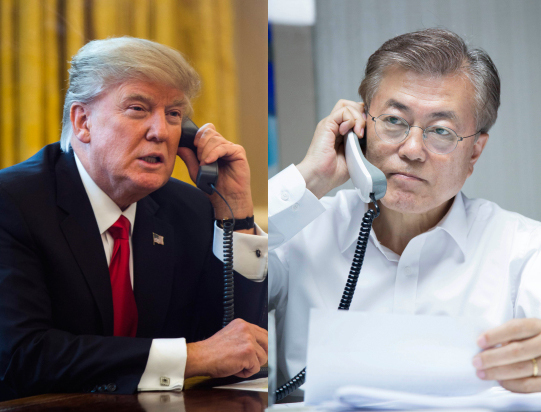President Moon Jae-in and his US counterpart Donald Trump are expected to hold their first summit next month in Washington, as they seek to coordinate North Korea policy following their respective leadership transitions, officials said Tuesday.
A visiting delegation of White House officials in charge of Korea affairs met with a group of foreign affairs and security advisers for Moon, chaired by former Ambassador to Geneva Chung Eui-yong. The representatives, led by Matt Pottinger, senior director for East Asia at the White House’s National Security Council, and including Allison Hooker, Korea director at the NSC, arrived here late Monday for a two-day stay.
 |
US President Donald Trump (left) and South Korean President Moon Jae-in (Yonhap) |
The allies have been striving to arrange an early meeting between the two leaders in a bid to quell concerns about a potential crack in their united front against North Korea, due chiefly to Moon’s pledge to reopen dialogue with the recalcitrant regime.
“The sides have agreed in principle to have a summit late June in Washington and to further consult on a detailed schedule and agenda through diplomatic channels,” Cheong Wa Dae’s senior press secretary Yoon Young-chan told reporters.
“The summit will provide a chance for the two leaders to promote friendship.”
Yoon noted that the envoys also reaffirmed their “common ground” on North Korea, with the ultimate goal of completely abolishing its nuclear and missile program. The allies will mobilize all available means including sanctions and dialogue, though dialogue with the North is possible only under the right conditions, and to that aim, they will explore bold and pragmatic steps together.
To facilitate preparations for the summit, Moon plans to dispatch Hong Seok-hyun, former chairman of the JoongAng Ilbo daily and cable network JTBC and who also previously served as ambassador to the US, as his special envoy as early as this week, Yoon said.
On the sidelines of talks with Chung, Pottinger also paid a seven-minute courtesy call to Moon. He then met with Lee Jeong-kyu, Seoul’s deputy foreign minister for political affairs, later in the day.
The delegation’s visit came on the day North Korea launched a new intermediate-range ballistic missile, which is speculated to be capable of flying a distance of at least 4,500 kilometers, and possibly up to 9,000 kilometers.
The latest provocation put Moon’s North Korea policy to an early test. While acknowledging the need for sustained sanctions and pressure, he has conveyed signals of rapprochement with the Kim Jong-un regime, saying during his oath of office that he would visit Pyongyang if conditions are met.
But Pottinger said the allies are “in alignment” that Pyongyang’s behavior is a threat to regional stability and security, though he fell short of elaborating on the conditions for possible talks with the North.
“Right now we certainly do not see the right conditions in light of the provocations. We would want to see concrete movement to reduce threats -- right now the threat is gathering,” he told reporters after the meeting with Lee at the ministry headquarters in Seoul.
On the Terminal High Altitude Area Defense anti-missile system, for which Trump demanded Seoul pay $1 billion, the journalist-turned-policymaker sought to calm concerns, saying it is a “settled matter.”
He also lauded South Korea’s “smooth” leadership transition despite months of political turmoil, saying it made democracy look “so easy.” Moon took office on May 10, one day after a snap election brought by the impeachment of former President Park Geun-hye.
“I have to say how I’m impressed with how smooth the transition is going here -- it makes me a little jealous,” Pottinger said.
“We know that it’s often difficult to go through transition especially after a difficult political crisis. I’m just humbled by the example that South Korea had set for the world.”
By Shin Hyon-hee (
heeshin@heraldcorp.com)







![[Today’s K-pop] Blackpink’s Jennie, Lisa invited to Coachella as solo acts](http://res.heraldm.com/phpwas/restmb_idxmake.php?idx=644&simg=/content/image/2024/11/21/20241121050099_0.jpg)
